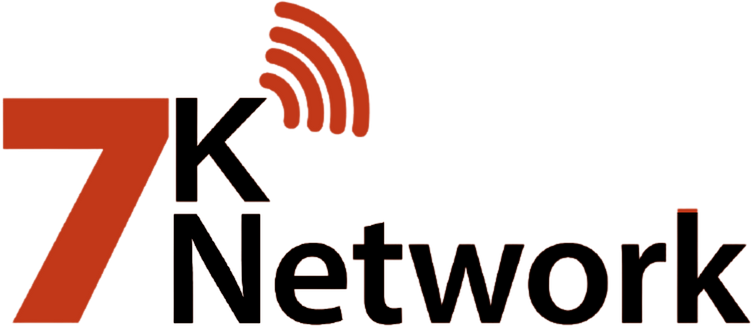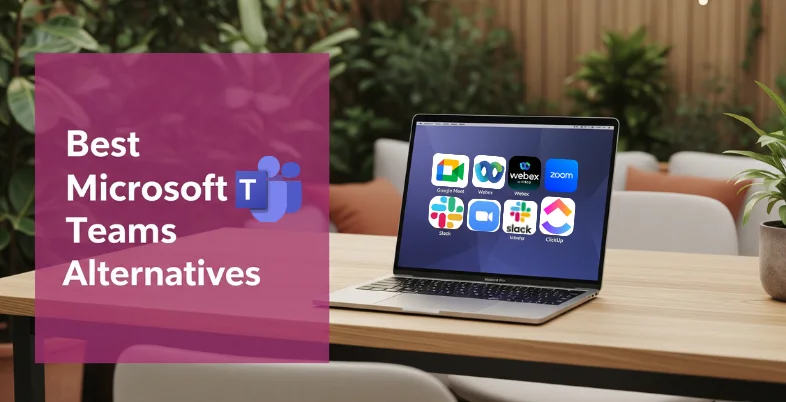Microsoft Teams has dominated the collaboration landscape for years especially among organizations deeply embedded in Microsoft 365. But that doesn’t mean it’s right for everyone. Many businesses are seeking lighter, more flexible, or more innovative tools that better align with their workflows. Whether it’s due to Teams’ complex UI, limited third-party integrations, or a preference for asynchronous communication, there are plenty of reasons to explore alternatives.
In this guide, we’ll highlight the top Microsoft Teams alternatives each designed to enhance team productivity through chat, video, tasks, and collaboration features. From open-source platforms to all-in-one workspaces, there’s something for every team’s size, budget, and tech stack.
Why Look Beyond Microsoft Teams?
Before committing to a new collaboration platform, it’s important to understand what might not be working with your current tool. The following are some typical explanations for why businesses are looking for alternatives to Microsoft Teams:
- Complex UI and Steep Learning Curve: Not all teams want or need the extensive features bundled into Teams, especially smaller or non-technical teams.
- Limited Compatibility Outside the Microsoft Ecosystem: Integration is smoother if you’re fully on Microsoft, but clunky if you’re not.
- Performance Issues: Teams can feel heavy or sluggish, especially in low-bandwidth environments or older systems.
- Asynchronous Collaboration Needs: Some teams prefer threaded conversations or platforms designed for deep work and time-zone flexibility.
- Better Pricing or Customization Elsewhere: Many Microsoft Teams alternatives offer more affordable plans or greater flexibility in deployment (cloud vs. on-premise).
List of Top 15 Microsoft Teams Alternatives for Collaboration & Communication
1. Slack
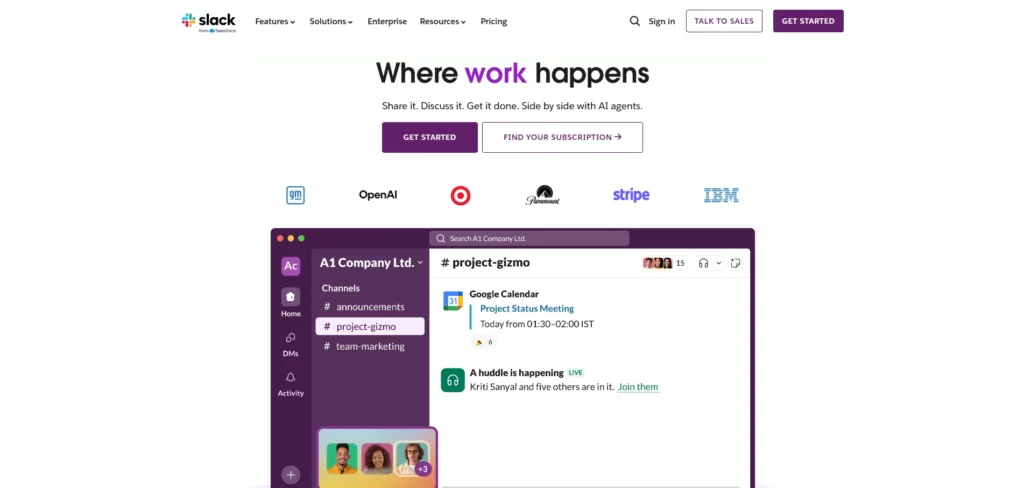
Website: https://slack.com
Slack is a powerful collaboration platform designed to streamline internal communication through organized channels, direct messaging, and integrations. As one of the most popular team communication apps, Slack is ideal for startups and enterprises alike, simplifying team coordination with threaded conversations, file sharing, and search capabilities. It supports seamless integration with 2,000+ tools, including Google Drive, Zoom, and Trello.
Teams can work together with outside partners with Slack Connect. Its interface is intuitive and customizable. Real-time notifications, video calls, and productivity bots make Slack a leading alternative to Microsoft Teams.
Features:
- Organized channels for teams/projects
- Direct and group messaging
- Integration with 2,000+ third-party tools
- Slack Connect for external communication
- Threaded conversations and file sharing
Pricing:
- Free – $0
- Pro – $4.38/user/month
- Business+ – $9/user/month
2. Zoom
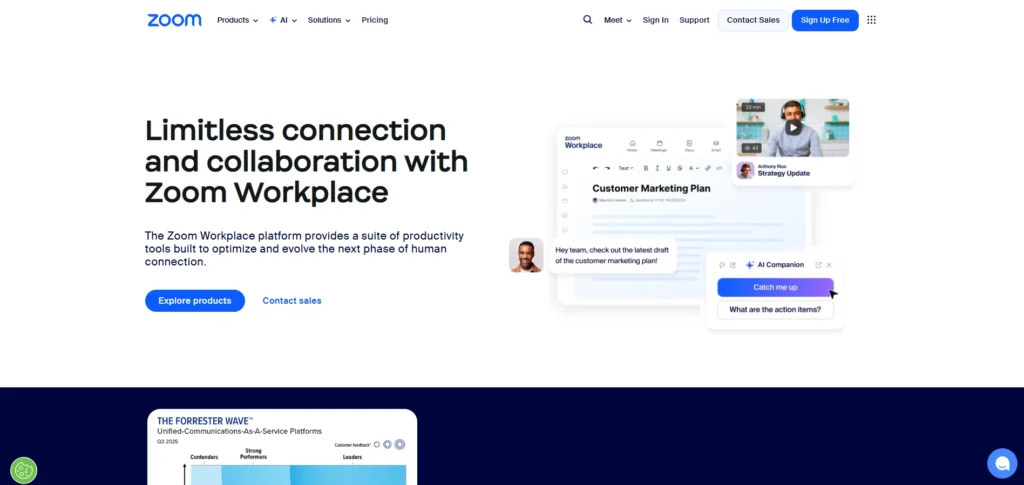
Website: https://zoom.us
Zoom is a popular video conferencing software option for remote teams and virtual events because of its powerful video conferencing features. With HD video, breakout rooms, webinar tools, and whiteboards, Zoom enhances collaboration for both internal and client meetings. It also offers chat, phone systems, and app integrations. From small teams to massive corporations, Zoom’s platform can grow with you.
It has sophisticated features including meeting analytics, noise reduction, and real-time transcribing. Scheduling and hosting are made simple by its user-friendly design.
Features:
- HD video and audio conferencing
- Breakout rooms and whiteboard tools
- Meeting recording and transcription
- Chat and Zoom Phone integration
- Integration with Microsoft 365, Google, Slack
Pricing:
- Basic – Free
- Pro – $16.99/month/host
- Business – $21.99/month/host
3. Google Meet
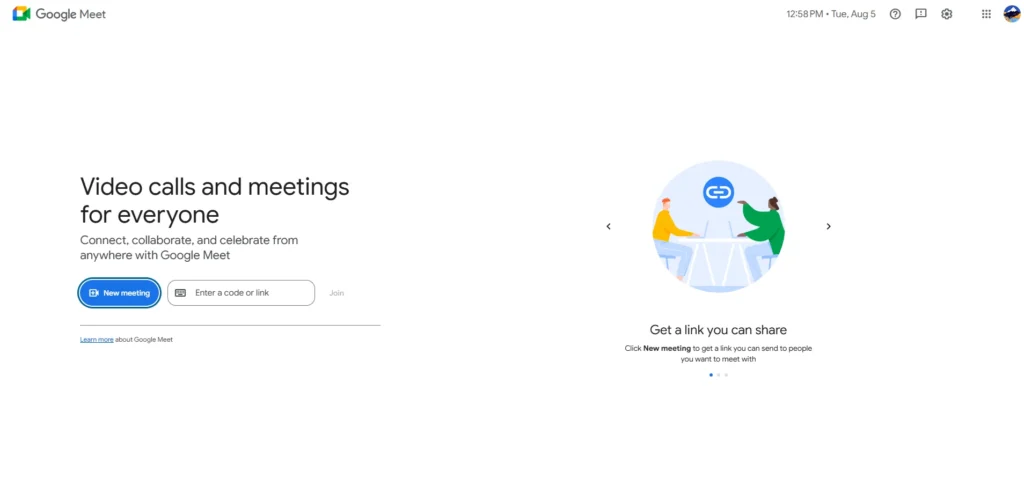
Website: https://meet.google.com
Google Meet, part of Google Workspace, is a secure and user-friendly video conferencing software. With real-time captioning, screen sharing, and simple calendar integration, it facilitates smooth communication. With no software installation required, users can join meetings through their browser or mobile app.
Its extensive integration with Google services, such as Calendar and Gmail, streamlines communication and scheduling. The interface is clean and accessible even to non-technical users. It is perfect for usage in small company, corporate, and educational settings.
Features:
- Browser-based video conferencing
- Real-time captions and screen sharing
- Google Calendar and Gmail integration
- Background noise cancellation
- Secure with end-to-end encryption
Pricing:
- Business Starter – ₹160/month/user
- Business Standard – ₹864/month/user
- Business Plus – ₹1,700/month/user
4. ClickUp
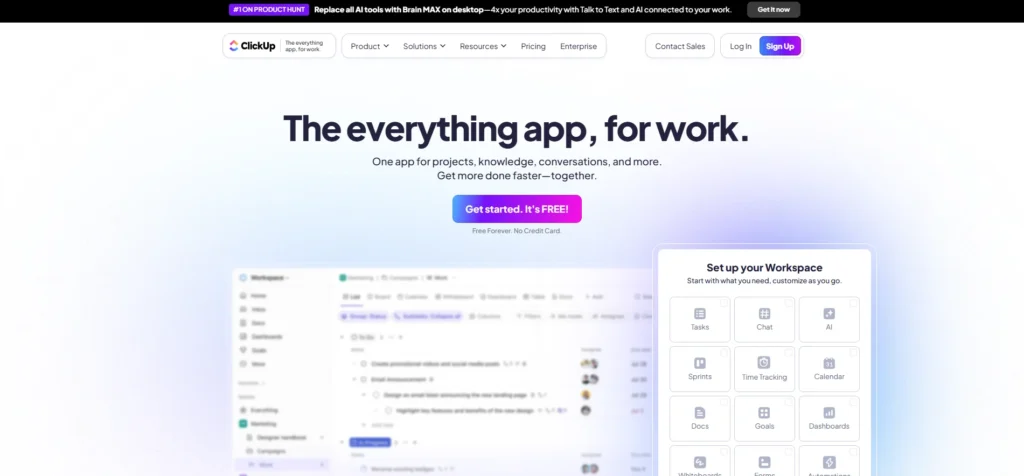
Website: https://clickup.com
ClickUp is more than just a collaboration tool—it’s a full project management suite. In a single location, teams may manage conversations, goals, documents, and tasks. It includes chat features, video conferencing, time tracking, and dashboards.
ClickUp allows for deep customization, making it suitable for agencies, developers, and remote teams. As a powerful Gantt chart software, it enables teams to visualize project timelines and dependencies effectively. It also supports integrations with Zoom, Slack, and Google Workspace. Its “Everything View” and automation features help in maintaining a single source of truth for projects.
- Task management and timelines
- In-app chat and video conferencing
- Custom dashboards and docs
- Workflow automation
- Time tracking and reporting
Pricing:
- Free Forever – $0
- Unlimited – $7/user/month
- Business – $12/user/month
5. Chanty
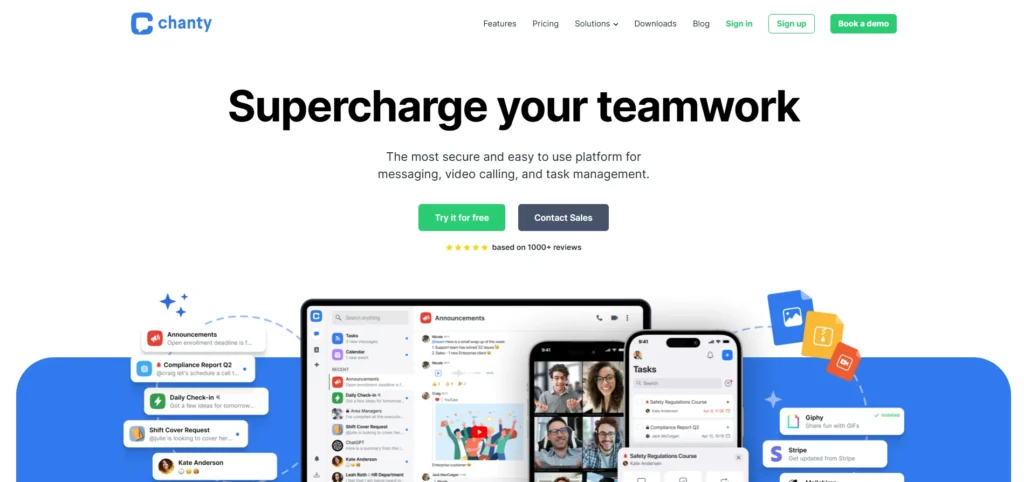
Website: https://chanty.com
Chanty is a straightforward AI-powered team chat program made for small businesses and startups. It combines instant messaging, task management, and voice/video calling into a user-friendly platform. Its built-in task manager lets teams convert messages into tasks, assign them, and track progress. Chanty also offers unlimited message history even in its free plan.
With robust integrations like Trello, GitHub, and Dropbox, it enhances team collaboration without unnecessary complexity. It’s ideal for remote and hybrid teams.
Features:
- Unlimited message history
- Team chat and video calls
- Built-in task management
- Teambook for organizing conversations/files
- Voice messaging and screen sharing
Pricing:
- Free – $0
- Business – $3/user/month
6. Cisco Webex

Website: https://www.webex.com
Webex is a scalable and secure enterprise-grade video conferencing software and collaboration system. It supports large meetings, team messaging, whiteboarding, and device integrations. Webex also provides AI-powered features like noise removal, meeting highlights, and transcriptions.
Its calling solutions are used by governments and global businesses for their reliability. Integration with productivity apps and hardware systems makes Webex ideal for hybrid work models. It’s particularly strong in regulated industries like healthcare and finance.
Features:
- HD video meetings and webinars
- Secure cloud calling and team messaging
- AI noise removal and transcription
- Integration with Microsoft Teams, Google, Salesforce
- End-to-end encryption
Pricing:
- Basic – Free
- Meet – $14.50/user/month
- Suite – $25/user/month
7. Zoho Cliq
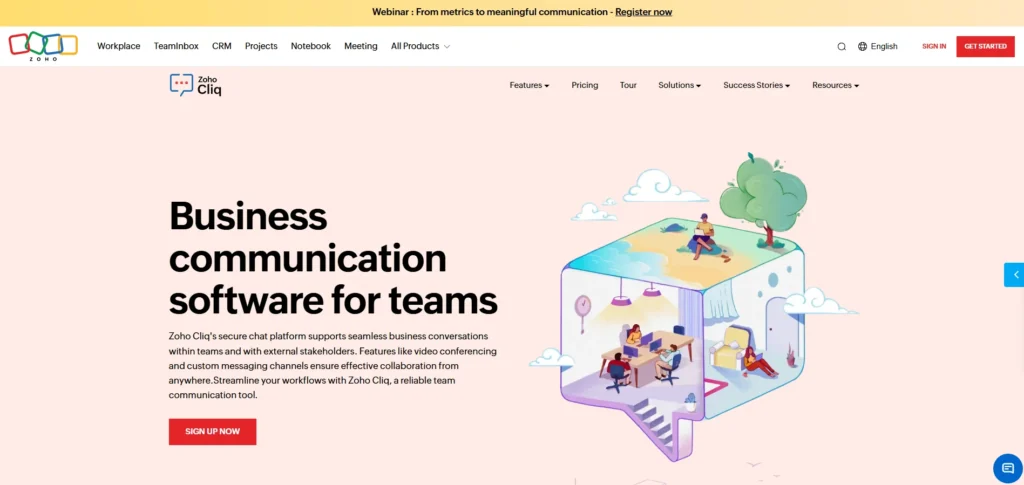
Website: https://www.zoho.com/cliq/
As a component of the Zoho ecosystem, Zoho Cliq provides workflow automation, audio/video calls, and real-time messaging. It works well as a stand-alone team chat platform and is best suited for companies who use other Zoho apps. Channels and threads keep conversations organized, while bots and commands automate repetitive tasks.
Additionally, Cliq facilitates screen sharing, file sharing, and live streaming. It’s cost-effective for small and mid-sized teams.
Features:
- Real-time messaging and channels
- Voice/video calls and screen sharing
- Bots, slash commands, and automation
- File and media sharing
- Zoho ecosystem integration
Pricing:
- Free – $0
- Standard – $18/month – 25 User
- Professional – $2/user/month
- Enterprise – $4/user/month
8. Mattermost
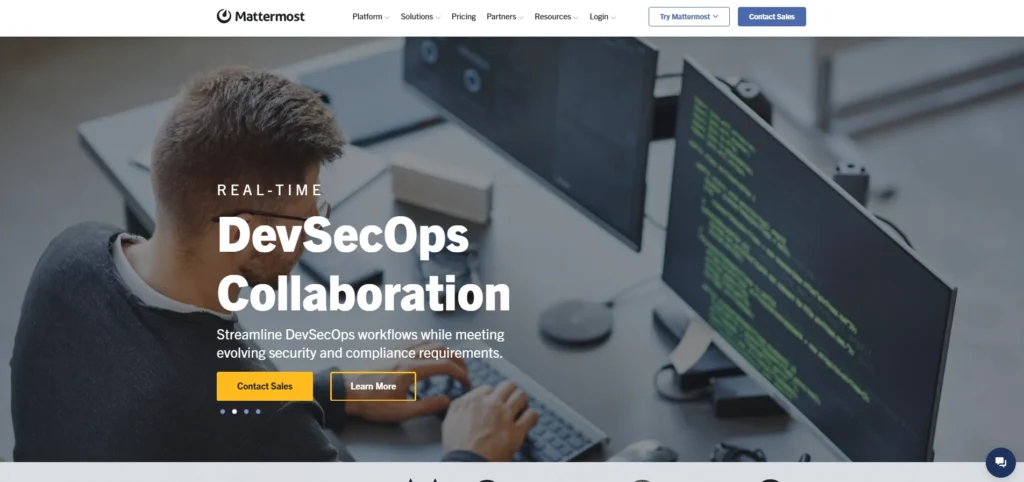
Website: https://mattermost.com
Mattermost is an open-source collaboration platform built for developers and security-conscious organizations. It supports messaging, file sharing, workflow automation, and voice calls. Its self-hosted option allows full data control, making it ideal for regulated industries.
Mattermost also supports DevOps tools like GitLab, Jira, and Jenkins. With customizable UI and plugins, organizations can tailor the platform to specific needs. It supports both cloud and on-premises deployment.
Features:
- Open-source and self-hosted options
- End-to-end encrypted messaging
- Voice/video calls and screen sharing
- DevOps tool integrations
- Highly customizable interface
Pricing:
- Free (self-managed)
- Professional – $10/user/month
- Enterprise – Custom
9. Element (Matrix)
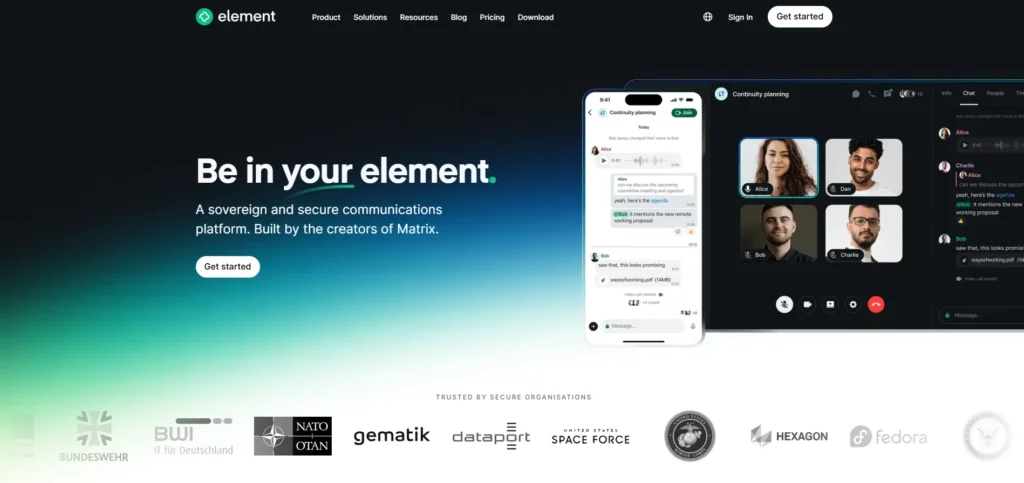
Website: https://element.io
Element is a messaging app that prioritizes anonymity and is based on the Matrix protocol. It’s perfect for safe communication in both private and professional contexts. It offers encrypted messaging, video calls, and file sharing, with cross-platform access.
Element allows federation, meaning you can run your own server and still communicate across networks. It’s widely adopted in public sector and defense environments for its decentralization. Despite its robust backend, the interface remains modern and user-friendly.
Features:
- End-to-end encrypted communication
- Federation and decentralization
- Custom server hosting
- Video calls and messaging
- Cross-platform apps
Pricing:
- Free – $0
- Enterprise – Custom Pricing
10. Ryver
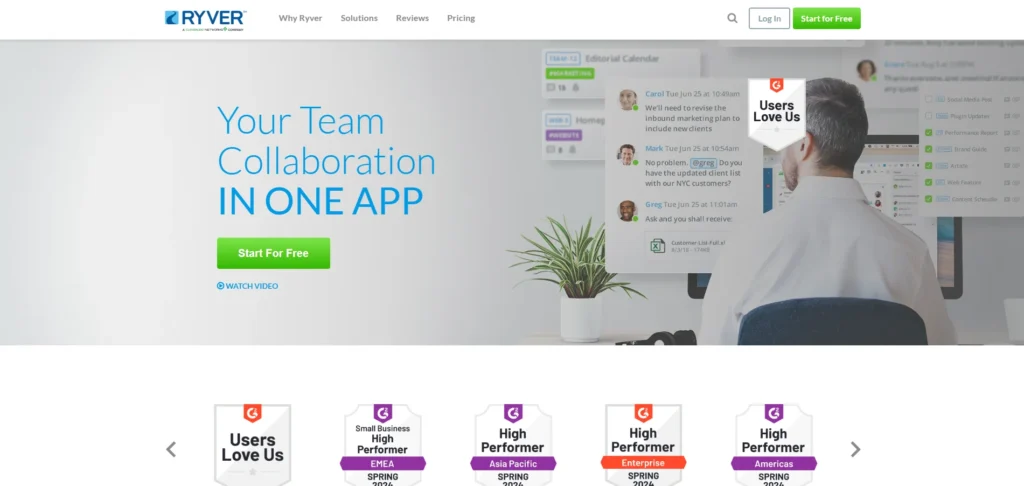
Website: https://ryver.com
Ryver is a platform that integrates work management with team communication. It’s like a blend of Slack and Trello, allowing users to chat, organize tasks, and collaborate on projects. Through conversations, teams may assign tasks, control workflows, and create postings. Ryver’s automation engine allows recurring tasks and approval flows.
It integrates with tools like Google Drive and Dropbox. It’s best suited for small to medium-sized teams seeking an all-in-one solution.
Features:
- Chat, task, and workflow in one
- Private and open channels
- Task boards with due dates and labels
- Post-based threaded discussions
- Integration with cloud storage
Pricing:
- Starter – $69/month (12 users)
- Standard – $129/month (30 users)
- Enterprise – Contact Sales
11. Flock
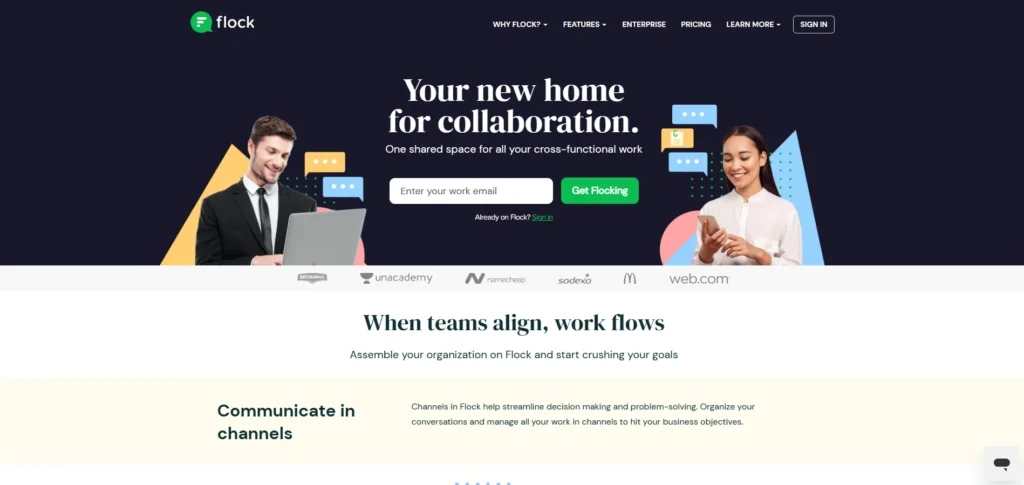
Website: https://www.flock.com
Flock is a collaboration and messaging tool tailored for startups and small businesses looking for an intuitive alternative to Microsoft Teams. It features chat channels, video calling, and built-in productivity tools like polls, reminders, and to-do lists. The interface is clean and easy to use, with quick access to shared files and pinned notes.
Flock makes it simple to swap between teams or workspaces and integrates with well-known programs like GitHub, Trello, and Google Drive. Its mobile apps are responsive and ensure that team communication is uninterrupted on the go. It’s also known for fast onboarding and minimal learning curve.
Features:
- Channel-based chat and video conferencing
- Built-in task management tools
- Shared notes and code snippets
- Native integrations with work apps
- Quick file sharing and search
Pricing:
- Starter: Free
- Pro: $6/user/month
12. Bitrix24
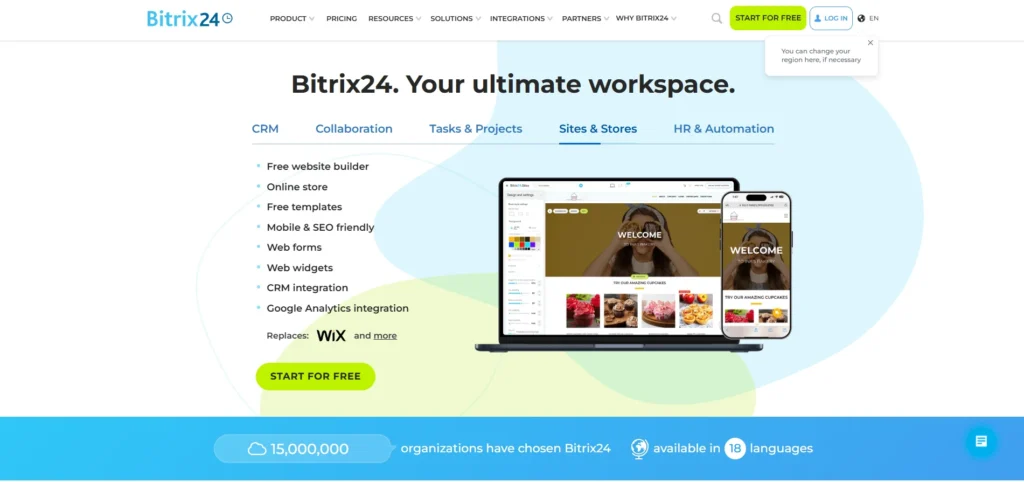
Website: https://www.bitrix24.com
Bitrix24 integrates document sharing, CRM, project management, and communication into one ecosystem. It’s more than just a Teams alternative, it’s a full-fledged digital workplace solution. Businesses can host video calls, use chat, manage calendars, automate tasks, and track sales activities all within one platform. It also serves as one of the most versatile marketing project management tools, helping teams align campaigns, timelines, and client communication in one place.
It offers an on-premise version with full source code access for companies needing extra control. Bitrix24 also includes HR tools, time tracking, and intranet features. With a generous free plan and customizable modules, it’s ideal for growing teams looking for scalability and integration.
Features:
- Video chat and real-time communication
- Project and task management tools
- CRM and sales pipeline management
- HR management and time tracking
- Document collaboration and drive
Pricing:
- Free: $0
- Standard: $124/month (up to 50 users)
- Professional: $249/month (unlimited users)
- Enterprise: $499/organization/month
13. Twist
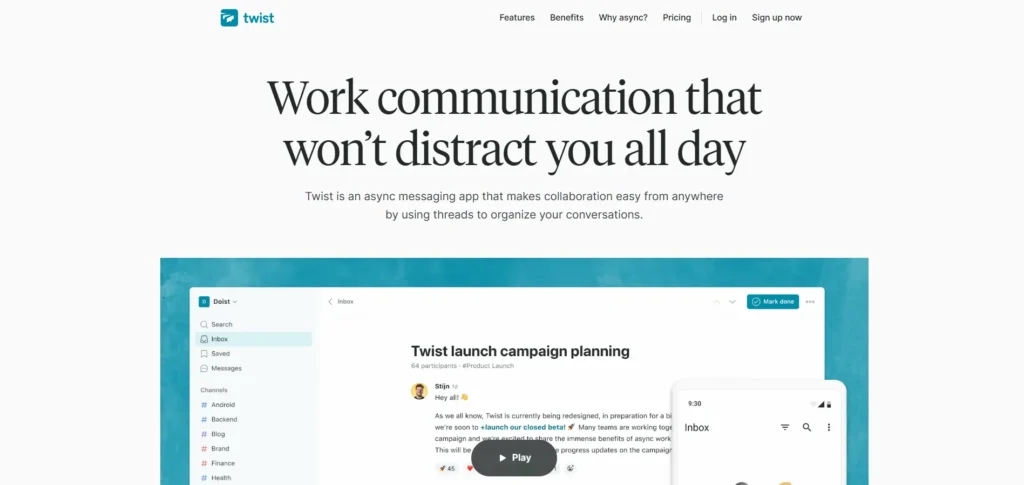
Website: https://twist.com
Twist by Doist offers an asynchronous communication platform for teams that prioritize focused work over real-time chatting. It differs from traditional tools by organizing conversations in threads rather than fast-paced chat streams, reducing noise and improving context. Designed for remote teams, Twist lets you disconnect without missing information, as all discussions are neatly archived.
It integrates with Todoist, GitHub, and other popular tools to centralize work communication. Twist is ideal for companies practicing deep work, flexible schedules, and async-first collaboration. Its minimal interface is distraction-free and designed for clarity.
Features:
- Threaded conversations instead of chat streams
- Asynchronous communication design
- Integrates with project management tools like Todoist
- Searchable message archives
- Focused, clutter-free interface
Pricing:
- Free: $0
- Unlimited: $6/user/month
14. Rocket.Chat
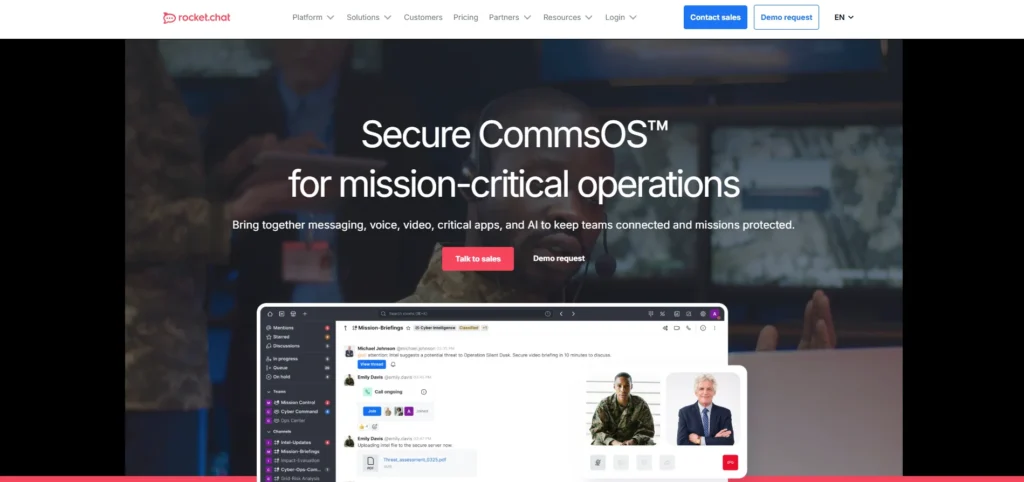
Website: https://www.rocket.chat
Rocket.Chat is a secure, open-source communication platform built for teams that need control over their data and infrastructure. With features like team messaging, voice/video calls, and real-time translation, it’s used widely in regulated industries like healthcare, government, and finance. Rocket.Chat provides end-to-end encryption for safe chats and self-hosting.
It also integrates with popular DevOps and productivity tools such as Jira, GitLab, and Zapier. Its scalability and API flexibility make it suitable for both startups and large enterprises.
Features:
- Self-hosted and cloud deployment options
- End-to-end encrypted messaging
- Video calls and live chat for customer support
- Role-based access control
- Integration with 200+ tools and APIs
Pricing:
- Community (Self-Hosted): Free
- Enterprise: Custom Pricing
15. Zulip
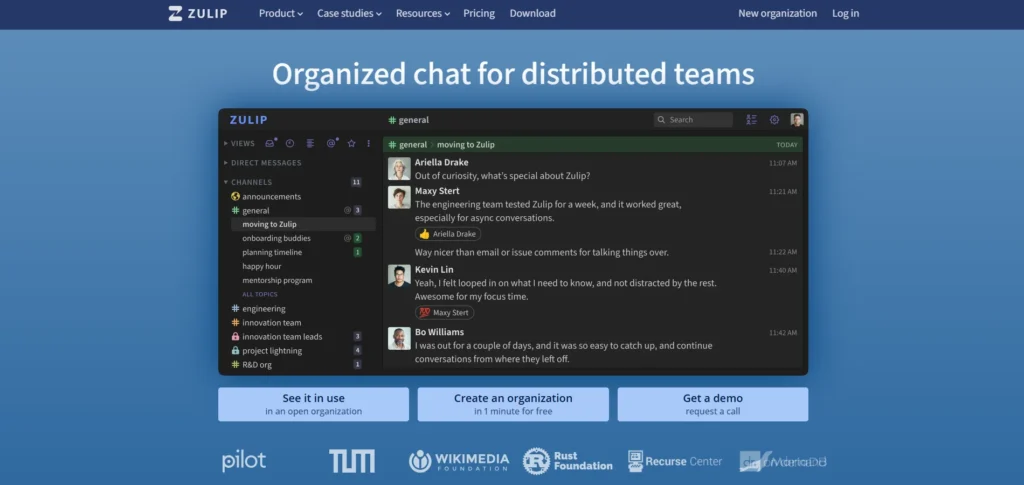
Website: https://zulip.com
Zulip combines real-time chat with an email-style threading model, offering a unique approach to team communication. Ideal for remote and distributed teams, Zulip organizes messages by topic within streams, making it easier to follow conversations. It supports markdown formatting, integrations, and both cloud and self-hosted deployment.
Zulip is especially popular in academic and open-source communities for its clean organization and open-source flexibility. The user interface supports keyboard shortcuts, custom notifications, and deep search functionalities.
Features:
- Topic-based threaded conversations
- Integrates with GitHub, JIRA, and more
- Desktop, mobile, and web apps
- Self-hosted and cloud options
- Full open-source access
Pricing:
- Free: $0 (Up to 10,000 messages searchable)
- Standard: $6.67/user/month
- Enterprise: Custom Pricing
Conclusion
While Microsoft Teams remains strong especially for those embedded in the Microsoft 365 ecosystem many modern alternatives offer better flexibility, easier usability, or lower costs. From Slack’s streamlined messaging and ClickUp’s all-in-one workspace to Mattermost or Rocket.Chat for self-hosted data control, you can find a platform that fits your business style and collaboration needs.
Your ideal tool depends on your team’s priorities: security, integration, AI features, task management, or ease of use. The good news is Microsoft Teams no longer needs to be the default. With powerful Microsoft Teams alternatives available, now is a great time to explore what fits your workflow, test a few options, and optimize team communication for the future.
FAQs
1. Which Free Program is the Greatest Substitute for Microsoft Teams?
Slack and Chanty offer strong free plans for messaging and collaboration. Zoom and Google Meet are excellent tools for video collaboration as well.
2. Which Alternative is Best for Video Conferencing?
Zoom is the best option for webinars and video conferences. Google Meet is a solid choice for Google Workspace users.
3. Can I Use these Tools on Mobile?
Yes, most alternatives like Slack, Zoom, and ClickUp have Android and iOS apps.
4. Are there Open-Source Alternatives?
Indeed, programs like Zulip, Rocket.Chat, and Mattermost are open-source and adaptable.
5. Which Platform Combines Communication and Task Management?
ClickUp is a top all-in-one platform. Slack also integrates well with Trello and Asana.
6. Is Zoom Better than Microsoft Teams?
Zoom is better for video calls, while Teams is stronger for document collaboration via Office 365.
